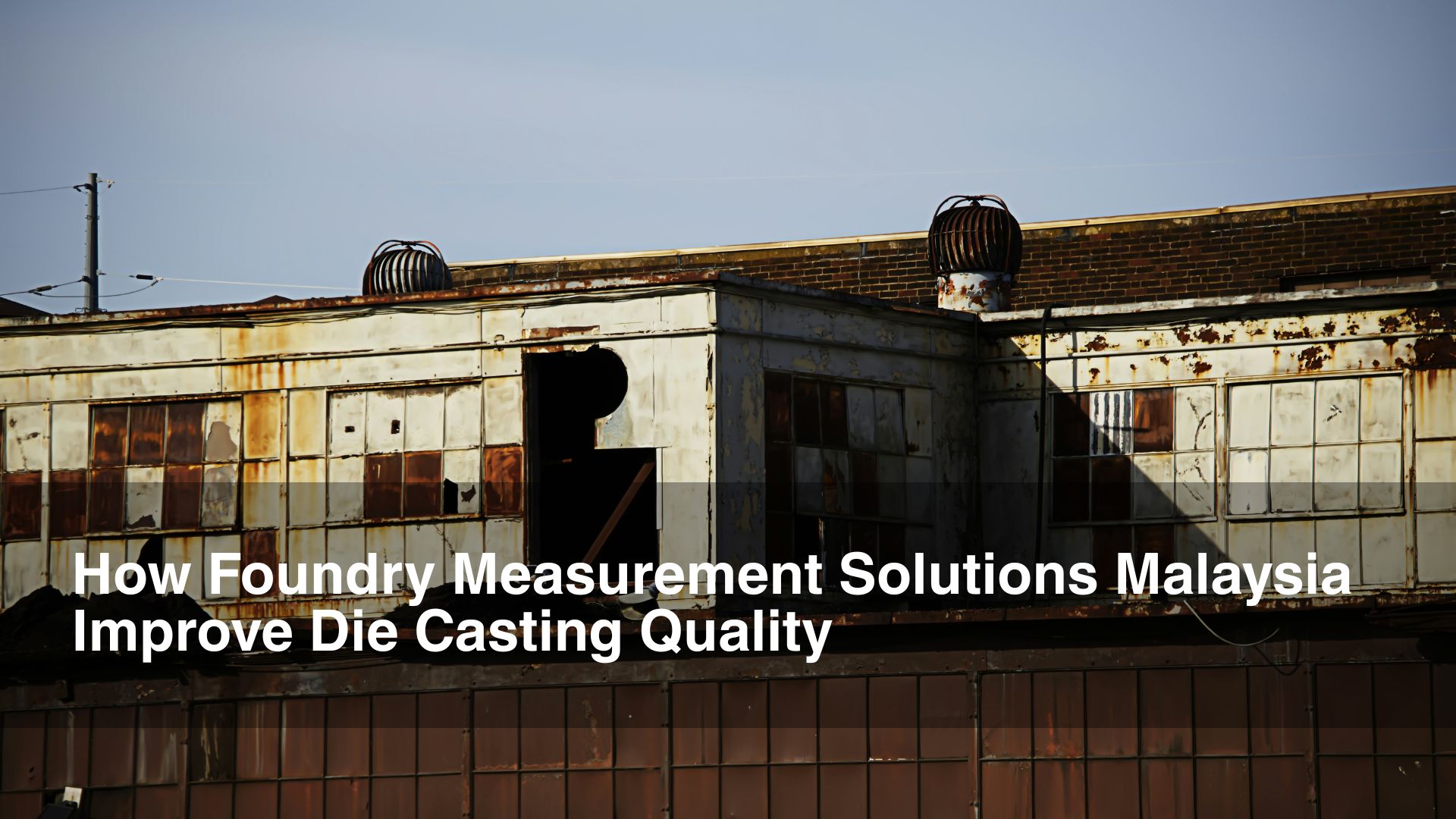Introduction to Foundry Measurement Solutions Malaysia
Foundry measurement solutions are pivotal in the die casting industry, particularly in Malaysia, where precision in manufacturing is paramount. These solutions encompass a variety of techniques and tools designed to ensure that each die-cast part meets the stringent specifications required for optimal performance. Accurate measurement is essential throughout the die casting process, influencing not only the quality of the final product but also the efficiency of production lines.
In the context of the Malaysian market, foundry measurement solutions Malaysia have been at the forefront of ensuring that local manufacturers can maintain high standards while competing on a global scale. As the demand for precision-engineered components continues to rise in various sectors, including automotive and electronics, the integration of state-of-the-art measurement solutions has become increasingly crucial. It allows manufacturers to monitor variables such as temperature, pressure, and dimensional accuracy, ultimately contributing to improved product reliability and durability.
The adoption of advanced foundry measurement solutions Malaysia facilitates real-time data collection and analysis, enabling manufacturers to quickly identify and rectify potential issues in the die casting process. This proactive approach not only reduces waste and rework but also enhances the overall quality of die castings. As technology continues to evolve, the role of these solutions in achieving consistent quality and regulatory compliance becomes more pronounced. Consequently, manufacturers in Malaysia are investing in these measurement systems to ensure they remain competitive and meet the growing expectations of consumers.
By embracing foundry measurement solutions, the Malaysian die casting industry can not only improve product quality but also enhance operational efficiency, positioning itself favorably in the larger manufacturing landscape.
Understanding Die Casting and Its Challenges in Foundry Measurement Solutions Malaysia
Die casting is a manufacturing process that involves forcing molten metal into a mold cavity under high pressure. This technique is often employed in producing complex shapes and thin-walled sections with high dimensional accuracy. Industries such as automotive, aerospace, and electronics leverage die casting to produce components that require high precision and repeatability. However, despite its advantages, die casting is not without its challenges.
One of the most common issues faced in the die casting industry is shrinkage. As metals cool and solidify, they tend to decrease in volume, leading to voids or uneven surfaces in the final product. These shrinkage defects can affect the mechanical properties and overall performance of components, resulting in products that may not meet quality standards. For instance, a shrinkage cavity in an automotive part could jeopardize its structural integrity during use.
Another challenge is misalignment during the die assembly process. If the mold sections are incorrectly aligned, it can lead to inconsistent part dimensions and affect the quality of the die-cast components. This misalignment can result in increased rework or scrap rates, impacting production efficiency and costs. Moreover, surface defects such as pores, blemishes, or rough textures can arise from inadequate mold preparation, improper temperature control, or insufficient flow characteristics of the molten metal. These surface imperfections are not only aesthetically unpleasing but can also impair the part’s performance and adherence to regulatory requirements.
Addressing these challenges is crucial to ensuring the production of high-quality die-cast components. Implementing foundry measurement solutions in Malaysia can provide valuable insights and precision in monitoring and controlling the various factors influencing the die casting process. By recognizing the common pitfalls and utilizing advanced measurement technologies, manufacturers can enhance both the quality and efficiency of their operations.
How Foundry Measurement Solutions Malaysia Detect Shrinkage
Shrinkage is a critical challenge in die casting, often leading to defects in components and impacting overall quality. Foundry measurement solutions in Malaysia have been specifically developed to effectively identify and mitigate shrinkage issues in die-cast products. Through the integration of advanced methodologies and technology, these solutions play a pivotal role in ensuring precision and quality control within the casting process.
One of the primary techniques employed is the use of thermal imaging and non-contact measurement systems. These systems can detect variations in temperature across the surface of the castings, which is crucial for identifying areas prone to shrinkage. By monitoring the cooling process and analyzing temperature gradients, technicians can pinpoint potential shrinkage locations before they become significant defects. This early detection allows for real-time adjustments to be made during the die-casting process, ultimately enhancing product quality.
Moreover, 3D scanning technology is also integrated into foundry measurement solutions in Malaysia. This technology provides a comprehensive overview of the dimensional integrity of the components being produced. When compared to the CAD models, any discrepancies indicating shrinkage are identified swiftly. This methodology not only raises awareness of potential defects but also assists in refining the die design, contributing to improved casting outcomes in the long term.
In addition to these methodologies, the implementation of sophisticated software analysis tools further supports the detection of shrinkage. These tools analyze data collected from various measurement techniques, enabling engineers to assess patterns and trends related to shrinkage occurrence. By utilizing predictive analytics, foundry measurement solutions can aid in vast improvements in process optimization, thus minimizing waste and enhancing efficiency.
Through these combined efforts, foundry measurement solutions in Malaysia are committed to addressing shrinkage and enhancing the overall quality of die-cast components. Applying such precise measurement techniques forms a substantial foundation for achieving sustainable manufacturing practices.
Identifying Misalignment Issues with Foundry Measurement Solutions Malaysia
Misalignment in die-casting processes can lead to significant quality and operational challenges, impacting the durability and functionality of the final product. Foundry measurement solutions in Malaysia are designed to effectively identify and address these misalignment issues, leveraging advanced technologies to enhance precision in manufacturing. Utilizing a variety of inspection techniques, these solutions ensure that components align correctly, which is crucial for maintaining the integrity of the die-casting process.
One of the key tools employed in identifying misalignment is optical measurement systems. These systems utilize high-resolution cameras and lasers to scrutinize the alignment of components throughout the manufacturing process. By providing real-time feedback, manufacturers can make immediate adjustments to rectify any deviations from the desired specifications. Additionally, coordinate measuring machines (CMM) play a vital role in this context. These machines perform precise measurements and can detect discrepancies in alignment at various stages of production.
Moreover, non-contact measurement techniques are increasingly prevalent within foundry measurement solutions in Malaysia. Technologies such as laser scanning and 3D imaging allow for comprehensive assessment without physical interference with the components. This reduces the risk of damage often associated with traditional measurement methods. Employing these advanced techniques not only ensures quality but also streamlines the overall production workflow.
Furthermore, data analytics integrated into these measurement solutions provide manufacturers with valuable insights into misalignment patterns. By analyzing historical data, companies can implement predictive measures to prevent recurrent issues. This proactive approach not only enhances product quality but also minimizes waste and operational downtime.
In conclusion, the implementation of foundry measurement solutions in Malaysia is crucial for accurately identifying and rectifying misalignment issues in die-casting processes. Through the use of innovative inspection techniques and tools, manufacturers can significantly improve the quality of their products and reduce the likelihood of defects, ultimately leading to increased customer satisfaction.
Surface Defects and Their Impact on Die Cast Quality
Die casting is a widely used manufacturing process that involves forcing molten metal into a mold to create parts with distinct shapes and intricate details. However, the presence of surface defects can significantly compromise the integrity and quality of the final products. Common surface defects in die casting include porosity, surface roughness, and dimensional inaccuracies. Each of these defects can lead to serious implications, including decreased product performance and durability, which ultimately affects customer satisfaction and operational efficiency.
Porosity, characterized by gas bubbles trapped in the solid metal, can weaken the structural integrity of the component. Additionally, surface roughness can result from improper mold design or inadequate cooling, leading to aesthetic issues and increased friction for moving parts. Dimensional inaccuracies can cause parts to be non-compliant with specifications, necessitating expensive rework or scrap. Addressing these defects is crucial for ensuring that die casting products meet industry standards and customer expectations.
The introduction of foundry measurement solutions Malaysia in the die casting process serves as a proactive approach to detect and mitigate these surface defects. Modern measurement technologies allow for real-time monitoring of various parameters during production, enabling early detection of potential issues. By implementing these advanced foundry measurement solutions, manufacturers can ensure that any deviations from the desired quality are quickly identified and rectified, thus preventing costly quality control problems.
Moreover, integrating sophisticated data analysis techniques into the measuring process enhances the ability to predict and eliminate defects, streamlining workflow and improving overall product quality. Through the application of foundry measurement solutions Malaysia, companies can achieve a higher level of precision, which ultimately contributes to improved production outcomes and enhanced competitiveness in the die casting market.
Laser Technologies in Foundry Measurement Solutions Malaysia
Laser technologies play a pivotal role in enhancing foundry measurement solutions in Malaysia, particularly for die casting processes. The integration of laser measurement techniques allows for exceptional precision in detecting flaws and ensuring the dimensional accuracy of die-cast parts. Unlike traditional measurement methods, laser systems are non-contact, which minimizes the risk of damage to the components being inspected. As such, these systems can be invaluable in the high-stakes environment of die casting, where micro-level discrepancies can result in significant cost increases and product failures.
One of the primary advantages of employing laser-based measurement solutions is their ability to collect data swiftly and accurately. High-speed laser scanners can capture thousands of data points per second, enabling real-time analysis of the parts being produced. This rapid data acquisition helps manufacturers identify potential defects immediately, leading to quicker decision-making processes and the ability to adjust manufacturing parameters on the fly. Moreover, the inherent accuracy of lasers supports stringent quality control measures, essential for maintaining competitive standards in the industry.
In addition to dimensional checks, laser technologies also facilitate surface inspection, allowing for an assessment of fine features that may be undetectable by conventional methods. This capability is particularly beneficial during the production of complex components, where intricate geometries need thorough examination. The result is a marked reduction in the likelihood of defects slipping through the cracks, which can lead to costly recalls or failures in the marketplace.
The evolving landscape of foundry measurement solutions in Malaysia increasingly highlights the benefits of laser technologies. By harnessing these advanced systems, Malaysian manufacturers can enhance product quality, optimize production workflows, and maintain consistent adherence to stringent industry standards, thus securing their position in a competitive market.
Optical Methods in Foundry Measurement Solutions Malaysia
Optical methods have gained significant traction in the realm of foundry measurement solutions Malaysia, demonstrating notable advantages over traditional measurement techniques. These methods leverage light to capture and analyze data with unparalleled precision, thereby enhancing the overall quality of die casting components. The primary optical techniques include laser scanning, digital imaging, and structured light measurement, each offering unique benefits that contribute to improved manufacturing processes.
One of the key advantages of using optical methods is their non-contact nature. Unlike traditional measurement techniques that often require physical contact with the component, optical systems can measure the surface and dimensional data without introducing any potential deformation or wear to the die cast parts. This ensures that the measurements are accurate and reflective of the actual geometrical properties of the components. Additionally, the speed at which optical systems operate significantly reduces the time taken for quality assurance processes, facilitating faster production cycles.
Furthermore, optical measurement solutions are capable of capturing intricate surface features and minute details that traditional methods might miss. Techniques such as laser triangulation and fringe projection are particularly adept at identifying surface defects, allowing manufacturers to spot and rectify issues early in the production process. This capability not only elevates the quality of the final product but also minimizes waste and lowers costs associated with rework or scrap production.
In the context of foundry measurement solutions Malaysia, the adoption of optical methods aligns well with the increasing demand for higher-quality standards and precision-engineered components. As the industry evolves, these advanced measurement techniques are set to play a vital role in ensuring that die casting processes meet stringent specifications while maximizing efficiency. The integration of these optical technologies represents a transformative step towards enhancing the overall quality and reliability of die casting manufacturing in Malaysia.
Benefits of Foundry Measurement Solutions Malaysia for Die Casting Quality
Foundry measurement solutions Malaysia play a pivotal role in enhancing die casting quality by streamlining processes, reducing waste, and increasing overall production efficiency. Implementing these advanced measurement technologies enables manufacturers to monitor various parameters during the die casting process closely. This precision ensures that each product adheres to the highest quality standards, ultimately elevating the reliability and durability of the final castings.
One of the most significant advantages of utilizing foundry measurement solutions is the marked improvement in production efficiency. By enabling real-time monitoring and analysis, these solutions allow for immediate detection of any deviations from the desired specifications. This timely intervention can prevent defects before they escalate, thus minimizing the need for costly reworks and reducing cycle times. Consequently, manufacturers can meet tight deadlines and respond more effectively to market demands, which is crucial in today’s competitive landscape.
Moreover, the adoption of foundry measurement solutions contributes to reduced waste generation. By optimizing the die casting process and ensuring precise material usage, manufacturers can significantly decrease the amount of scrap produced. This not only leads to cost savings but also reinforces sustainability initiatives by minimizing the environmental impact associated with excessive waste. Ultimately, well-implemented measurement solutions lead to a more efficient production milieu, where every resource is utilized effectively.
Additionally, companies embracing these measurement solutions enhance their competitiveness in the global market. In an environment where high standards of quality are paramount, organizations that prioritize advanced measurement techniques are better positioned to meet customer expectations and regulatory requirements. This commitment to quality not only attracts more customers but also fosters brand loyalty, securing a stronger footing in the industry.
In conclusion, the integration of foundry measurement solutions in Malaysia significantly uplifts die casting quality by improving efficiency, reducing waste, and enhancing competitiveness, making them indispensable tools for modern manufacturing processes.
Future Trends in Foundry Measurement Solutions Malaysia
The landscape of foundry measurement solutions in Malaysia is evolving rapidly, driven by advancements in technology and an increasing demand for precision in die casting processes. As industries worldwide strive for enhanced efficiency and quality, several emerging trends are anticipated to further reshape the sector. One of the most significant developments is the integration of automation and artificial intelligence (AI) within measurement systems. This will not only streamline the data collection process but also enable real-time monitoring of operations, thus ensuring that quality control standards are consistently met.
Moreover, the adoption of smart technologies like the Internet of Things (IoT) is set to revolutionize foundry measurement solutions in Malaysia. By connecting measurement instruments to the cloud, manufacturers can access critical data remotely, facilitating predictive maintenance and decreasing downtime. The wealth of information gathered can lead to improved calibration and benchmarking of measurement tools, ensuring higher accuracy in die casting processes and reducing defects in finished products.
Another trend is the move towards more advanced measurement techniques, such as non-destructive testing (NDT) and enhanced optical measurement systems. These techniques not only facilitate the inspection of complex geometries but also allow for more precise quality assurance practices. As the demand for lightweight and durable die-cast components rises, particularly in the automotive and aerospace sectors, these advancements are essential to meet stringent performance criteria.
As we look to the future, the continuous evolution of foundry measurement solutions in Malaysia is likely to foster further innovation within the die casting industry. By embracing these emerging technologies, manufacturers will be well-positioned to enhance product quality, optimize production processes, and sustain competitiveness within the global market.










